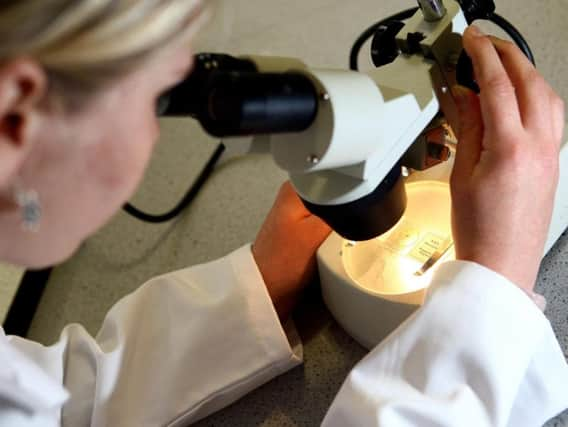Cervical cancer diagnoses could fall with new screening regime


At present, 2,500 women in England are told they have cervical cancer each year but experts say a more accurate test would slash this figure by 400 to 500 cases.
The new way of testing was found to be much more accurate than current smear tests in picking up abnormal changes to cells that could lead to cervical cancer.
Advertisement
Hide AdAdvertisement
Hide AdFurthermore, it means that women who are known to be low risk could safely have cervical screening every five years rather than the current three, the study found.
The research, published in the British Medical Journal (BMJ), examined a new NHS system which means cervical samples are initially tested for human papilloma virus (HPV).
HPV is a common infection spread through close skin-to-skin contact, usually during sex or oral sex.
HPV causes almost all cases of cervical cancer and can also cause cancers in other genital areas, such as the vagina, vulva, penis and anus.
Advertisement
Hide AdAdvertisement
Hide AdAt present, cervical screening samples are examined and those that show possible changes to cells are tested for HPV.
But this is now being switched around, with cells first tested for HPV infection, and only those that have the virus examined for abnormal cells.
Researchers found the new method picked up more cases of pre-cancerous lesions.
First testing for HPV enabled detection of 50% more abnormal changes at grade 2 or worse (known as cervical intraepithelial neoplasia or CIN 2) and 40% more at grade 3 or worse (CIN 3), plus 30% more cases of cervical cancer.
Advertisement
Hide AdAdvertisement
Hide AdThe experts, from a range of UK universities, hospitals and Public Health England, concluded: "At present, 2,500 women are diagnosed with cervical cancer each year in England, with a quarter diagnosed after negative cytology.
"Screening with hrHPV testing would translate to 400-500 fewer cases, or an about 20% decrease in the overall incidence, once hrHPV screening is rolled out nationally."
The researchers also said the findings supported extended cervical screening to once every five years for low risk women "without increasing the risk of potentially life-threatening disease".
Previous US studies have found that screening more frequently than every five years does not substantially improve the benefits for women, but it can increase the number of screening tests and follow-up procedures.
The BMJ study involved six NHS laboratories across England.
Advertisement
Hide AdAdvertisement
Hide AdResearchers examined data for 578,547 women aged 24 to 64 undergoing cervical screening between May 2013 and December 2014, who were followed up until May 2017.
Lead author Matejka Rebolj, senior epidemiologist from King's College London, said the new regime would save lives in the future, although an exact figure for lives saved has not been calculated.
She added: "Our study confirms that hrHPV screening is practical on a large scale and confers greater sensitivity than current smear testing.
"This means that the women whose lives can be saved through screening will be better served by the new test.
Advertisement
Hide AdAdvertisement
Hide Ad"At the same time, women with negative test results will not need to be screened as often as they are now."
A spokeswoman for NHS England said: "As part of the NHS Long Term Plan, work is already under way to ensure faster, earlier diagnosis and improved screening for cervical cancer.
"The roll-out of this new way of screening has already started and will be across the whole country by the end of this year, identifying more women who are at risk of cervical cancer and ultimately saving even more lives."